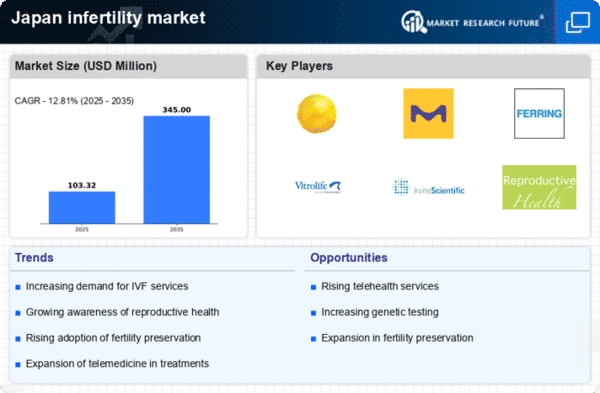Rising Infertility Rates
The increasing prevalence of infertility in Japan is a primary driver for the infertility market. Recent statistics indicate that approximately 15% of couples in Japan experience difficulties in conceiving, which has led to a heightened demand for fertility treatments and services. This trend is further exacerbated by factors such as delayed marriage and childbearing, as well as lifestyle changes. As more individuals seek assistance, the infertility market is likely to expand, with a projected growth rate of around 8% annually. This rising demand for fertility solutions is prompting healthcare providers to innovate and enhance their offerings, thereby contributing to the overall growth of the industry.
Increased Awareness and Education
There is a growing awareness and education regarding infertility issues in Japan, which serves as a crucial driver for the infertility market. Public health campaigns and educational programs are helping to destigmatize infertility, encouraging couples to seek help sooner. This shift in perception is likely to lead to an increase in consultations and treatments, as individuals become more informed about their options. Furthermore, healthcare providers are increasingly offering workshops and seminars to educate the public about fertility health, which may contribute to a more proactive approach to reproductive health. As awareness continues to rise, the infertility market is expected to experience a corresponding increase in demand for services.
Government Initiatives and Funding
Government initiatives aimed at addressing infertility issues are playing a pivotal role in shaping the infertility market in Japan. The Japanese government has implemented various policies to support couples facing infertility, including subsidies for fertility treatments and funding for research in reproductive health. These initiatives not only alleviate the financial burden on couples but also encourage more individuals to pursue treatment options. Recent reports indicate that government funding for fertility treatments has increased by 20% over the past few years, reflecting a commitment to improving reproductive health. Such support is likely to enhance the growth prospects of the infertility market, making treatments more accessible to a broader population.
Cultural Shifts and Family Planning Trends
Cultural shifts in Japan regarding family planning are influencing the dynamics of the infertility market. As societal norms evolve, there is a noticeable trend towards prioritizing career and personal development before starting a family. This delay in childbearing often leads to increased infertility rates, as age is a significant factor in fertility. Consequently, couples are more inclined to seek fertility treatments as they navigate these changing societal expectations. The infertility market is likely to benefit from this trend, as more individuals recognize the importance of addressing fertility issues earlier. This cultural shift may result in a sustained demand for fertility services, thereby driving market growth.
Advancements in Assisted Reproductive Technologies
Technological innovations in assisted reproductive technologies (ART) are significantly influencing the infertility market in Japan. Techniques such as in vitro fertilization (IVF) and intracytoplasmic sperm injection (ICSI) have seen substantial advancements, improving success rates and making treatments more accessible. The introduction of preimplantation genetic testing (PGT) has also enhanced the ability to select viable embryos, thereby increasing the likelihood of successful pregnancies. As these technologies continue to evolve, they are expected to attract more patients, further driving the growth of the infertility market. The market for ART in Japan is projected to reach approximately $2 billion by 2027, reflecting the increasing reliance on these advanced treatments.
















